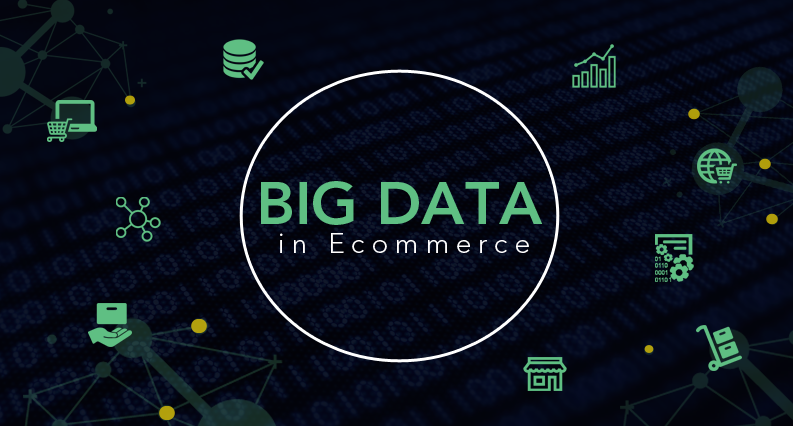Knowledge is power.
But in the age of the internet & machine learning, data is power.
It’s the data that helped Amazon increase its sales by 30% by making relevant product recommendations.
It’s the data that let Target knew one of its customers is pregnant even before her family knew it.
Big data (or simply put, large volume of data accumulated primarily through internet) has provided ecommerce businesses with a powerful resource to accelerate their business growth.
By connecting the dots of consumer behavior more precisely, big data analysis enables e-retailers to make more informed decisions in their quest of engaging customers.
According to studies, ecommerce firms that make decisions based on big data analysis enjoy an overall 5-6% more growth (in terms of conversion, sales, customer acquisition, etc.) than competitors that don’t.
As an ecommerce startup, you certainly wouldn’t want to miss out on the crucial edge you can get over competitors with big data. So, here are 3 most effective ways to use big data for the growth of your ecommerce business.
USE 1: In Providing Personalized Shopping Experience
According to Hubspot, for sales growth through personalization, ecommerce businesses need to primarily focus on three types of data available*, which are;
- Behavioral data (product/services customers view & purchase),
- Brand interaction data (website pages customers visit, their response to your emails & on social profiles)
- Demographic data (age, gender, geographic location, marital status, etc.)
Once combined, this data produces consumer behavior patterns, which put retailers closer to answering the question – “what the customer will buy next?”
On generalizing these customer behavior insights on similar customers, retailers can make better recommendations to save them search & browsing time;thus, enhance the shopping experience, and turn one time shoppers into repeat customers.
*The available data won’t be organized as above; therefore, you would need to sort it using various tools, which we have covered later in the post.
An ecommerce platform that helps you formulate data-driven business strategies
USE 2: In Planning Better Promotional Offers
One of biggest advantages of big data analysis in the ecommerce industry is that it helps retailers in keeping up with the new breed of customers – the omnichannel shoppers.
How customers are coming to your store; from where they are buying (website, social media, or offline outlets);which device they are using to look for products & which for the purchase;how they are paying (cash, credit card or digital wallet); which product is popular in a particular geographic area; and so on; all this information is crucial for focused customer group targeting during a promotional campaign &big data analysis provides very clear insights on all these questions.
Once you have all this data in place it becomes easy to answer critical questions related to a promotional campaign, such as:
- Which product should be promoted in particular geography
- How much discount should be provided
- Which channels should be used for advertising & which for selling
- What should be the lowest possible level of inventory
- Which payment methods to include in the campaign, &
- For how long the campaign should run
Suggested Read: A Progressive Guide on How to Scale Your Ecommerce Startup
USE 3: In Improving Product/Service Quality
Customer feedback has always been crucial in improving product quality. But today, reviews & testimonials can be made up or may not reflect customers’ true reaction towards a product or service. But the sales data don’t lie. If there is a decline in sales, it means improvements are needed.
Data related to conversion, cart abandonment, customers’ browsing habits, market performance of competitors’ product/service, etc., plays crucial role in determining whether things need to be improved; and if yes, then precisely what.
Other use of big data in this regard is providing better customer service. With big data, it is easy to determine which online channels your target audience goes to collect information about your products/services, and how they prefer to connect with you. Managing your customer support accordingly will help you cater customers more effectively, thus, improve customer satisfaction.
Suggested Read: Reasons behind shopping cart abandonment and how to counter them
Essential Big Data Tools
Apart from knowing about these big data applications in ecommerce, it is also crucial to learn about the tools for handling & analyzing it. Based on the jobs involved in the whole big data analysis & implementation process, here are some tools you should be aware of:
Data Collection/Extraction
Before starting off, know about the resources to collect data from. Some common sources include your own transactional systems, reward & referral system, website visitor stats, etc. Other resources include, obtaining unorganized data through tools & from information stockrooms, warehouses, etc. Most popular tools for data collection are:
- io
- Portia
Storage Management
Traditional system cannot handle big data aptly (which is why it is called ‘big’ in the first place). Other than that, how swiftly you can find, access, & use data basically depends on how it is stored. Best tools for big data storage management are:
- Hadoop
- Cloudera
Cleaning
It is likely that most of the data collected from the web will be unorganized. To put it into well-structured, usable data sets, you would need to take it through data cleaning process. Helpful tools in this regard are:
- Data Cleaner
- Open Refine
Mining
This is where the good part begins. Data mining involves scanning through data sets, classifying previously occurred patterns & new, unrecognized ones, which would later be used for decision making. There are plenty of good tools for data mining; a couple of big names include:
- Oracle Data Mining
- Teradata
Analysis
Key data sets & patterns identified during the mining stage are then analyzed on various parameters to make predictions & formulate strategies. Most reliable big data analysis tools include:
- Qubole
- BigML
Other than these, a few tools for data visualization (conveying data analysis in easy to understand format) & data integration (for integrating above-mentioned tools to streamline the process) are also worth noting.
Data Visualization
- Tableau
- Silk
Data Integration
- Blockspring
- Pentaho
YoKart ecommerce platform is open to all sorts of customization & integration
Conclusion
The advent of big data in ecommerce has given businesses deeper access to customer behavior insights, which wasn’t possible in the pre-internet era. Retailers can now predict customers’ expectations more precisely & mould their offerings accordingly.
But for the most part, we have just started. Real-time big data analysis (RTBDA), voice-based search data collection – there are many advancements yet to go mainstream in the field.
For ecommerce startups, it is crucial that they stay as the early adopters of any innovation that takes place in the world of big data to provide their customers great experiences and stay ahead of the competitors.
Recommended Reading: Past, Present and the Future of eCommerce



